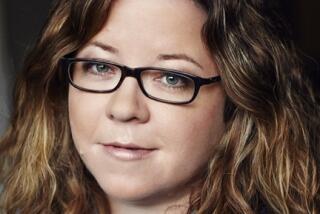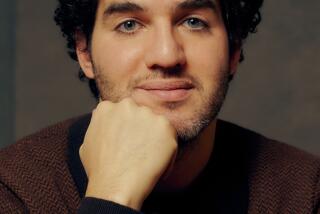Here’s everything explained in ‘Fear Street Part 3: 1666’ — the epic Netflix finale
- Share via
Warning: The following story contains spoilers for the entirety of Netflix’s “Fear Street” trilogy, including the third and final installment, “Fear Street: 1666.”
The time has come for the mysterious secrets of Shadyside, Ohio, to be revealed. However, the ending to Netflix’s haunting “Fear Street” trilogy comes with a twist.
Released over three consecutive weeks, “Fear Street: 1994” and “Fear Street: 1978” laid the groundwork for the curses and clues that pay off in “Fear Street:1666.”
We’ve collected all the key answers from “Fear Street: 1666” that help finally cool off its predecessors’ burning questions.
The creators and stars behind Netflix’s breakout ‘Fear Street’ horror trilogy unpack the queer, feminist messages embedded throughout the series.
Goode is bad
The biggest payoff for the trilogy is that Sheriff Nick Goode (Ashley Zukerman) and the entire Goode family line are responsible for making and honoring the longstanding deal with the devil — not Sarah Fier. In fact, the Fier portrayed in the beginning of the film is not a witch, but after she’s seen kissing Hannah Miller (Olivia Scott Welch) she is accused of being one.
When the town needs someone to blame after Pastor Miller (Michael Chandler) became possessed and gouged out the children’s eyes, Thomas (McCabe Slye) rallies the town to label Sarah Fier a witch who laid with the devil and enchanted Miller’s daughter into a kiss.
However, the true demonic ally is Solomon Goode (Zukerman), who pretends to be Fier’s ally until she discovers that Sheriff Goode’s ancestor is the one who made the deal with the devil in exchange for generational power.
His deal ensured that while all of the people of Shadyside were cursed, he and his entire bloodline would maintain the highest titles, such as mayor and sheriff.
‘Fear Street: 1978’ is the second part of the new horror trilogy arriving on Netflix in July. We’re breaking down the most pressing questions for the final film to answer.
Goode’s deal is made with several different devils
Though the movies have used devil as a singular, in actuality, Goode calls upon several different devils and demons for his deal.
He calls: “Bael,” known as “the lesser key of Solomon” that does his bidding in demonology; “Azazel” and “Abaddon,” demons in Hebrew mythology; “Ahriman,” an evil spirit in Persian mythology; “Rimmon,” the devil that guards Hell; “Samael,” a devil often called “The poison of God”; and “Gorgon,” a monster from Greek mythology (yes, think demi-gorgon from “Stranger Things”).
He also calls to “Beelzebub,” who’s known as the prince of devils and to “Satan,” “morning star” and “Lucifer” to address the devil in all his names and forms.
To seal the deal, Goode and his descendants must offer human sacrifices to keep the blood literally flowing, which is why the continual murder of innocents is an essential part of the curse.
He is also using the incantation book that nurse Lane (Jordana Spiro) eventually found — most likely after discovering Goode’s secret cave, where the deal was made, around “Fear Street: 1978.”
The reason names were carved into the cave was to indicate that another soul needed to be possessed and sacrificed to the devils.
The “1666” Goode attempts to justify his actions, as he’s just “taking what they all came there for” as Puritans: “power, prosperity and legacy.”
‘Fear Street: 1994’ is just the first part of a new horror trilogy arriving on Netflix in July. We’re breaking down the most pressing questions for the next two films to answer.
The real Sarah Fier creates her own curse
There’s the Fier that audiences have been led to fear in the previous films, and then there’s the real Sarah Fier (Elizabeth Scopel). In possibly the most tricky plot twist of the final film, Fier is not who many believe her to be.
While she is not the one responsible for the Shadyside curse, she does vow to unleash her wrath when the town decides to hang her.
Resigned to the belief that she will never convince her misogynistic society otherwise, Fier confesses to being the witch they want her to be to save Miller.
Before she’s hung, Madeira’s Fier says, “The truth will come out. Maybe not today, maybe not tomorrow, but it will. The truth shall be your curse. It will follow you for eternity. I will shadow you forever. I will show them what you’ve done. I will never let you go.”
Then — taking the form of Scopel — she repeats the words Madeira said and adds “you will feel the grip of my hand,” in reference to when Goode cut off Fier’s hand, which becomes a key part of her curse.
This curse explains why Shadysiders see into the past when they touch the hand of Fier — to guide them to break the curse.
The third Netflix R.L. Stine movie, ‘Fear Street Part 3: 1666,’ wraps the trilogy up satisfyingly.
The Goodes represent corrupt systems of power
While “1978” protagonist Ziggy (Sadie Sink) once trusted Nick Goode, he betrayed her when it mattered most. This is also true for Fier, as Solomon Goode said he loved her and then proceeded to chop off her hand and sacrifice her life to the townspeople.
In every generation after the curse, a Goode was placed into a position of power that enabled them to shame and criminalize Shadysiders while bolstering their own magically enhanced status.
“Fear Street: 1666” brings back Martin (Darrell Britt-Gibson) whom Josh met at the police dispatch in “Fear Street: 1994,” and reveals that Goode planted the spray cans that Martin was arrested for possessing.
Goode used the cans to graffiti rumors supporting the Fier curse, reading “she’ll take your blood. She’ll take your head. She’ll follow you until you’re dead” along with other messages.
In this way “Fear Street: 1666” reflects how patriarchal power often gaslights women from their experiences and the way racial profiling can be covered up under false personas of justice.
It also highlights the disparities between Shadyside and Sunnyville. While Goode’s brother is the mayor of Sunnyville, the town prospers. However, in Shadyside,” the “outsider” residents are blamed for the death and misfortune of their town.
This reflects the way in which marginalized communities are often blamed for their circumstances, even when it’s a corrupt — and in this case, cursed — system that designs things to be the way they are.
More to Read
Only good movies
Get the Indie Focus newsletter, Mark Olsen's weekly guide to the world of cinema.
You may occasionally receive promotional content from the Los Angeles Times.











